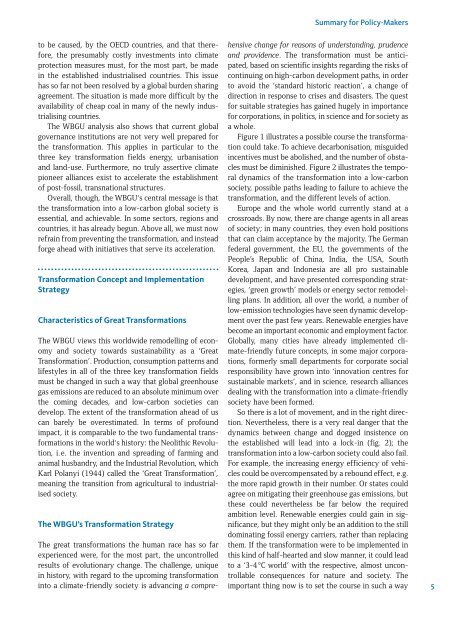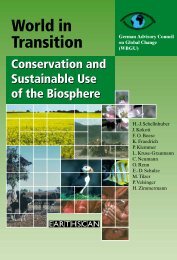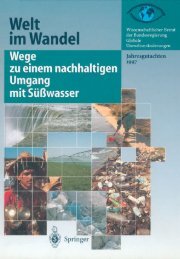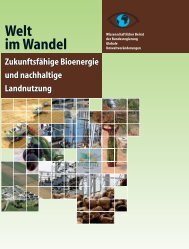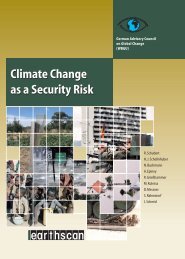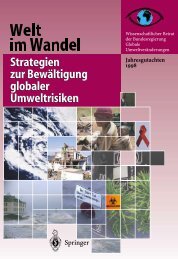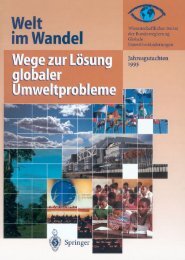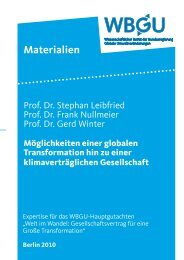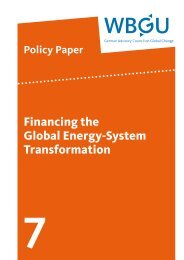World in Transition: A Social Contract for Sustainability - WBGU
World in Transition: A Social Contract for Sustainability - WBGU
World in Transition: A Social Contract for Sustainability - WBGU
You also want an ePaper? Increase the reach of your titles
YUMPU automatically turns print PDFs into web optimized ePapers that Google loves.
to be caused, by the OECD countries, and that there<strong>for</strong>e,<br />
the presumably costly <strong>in</strong>vestments <strong>in</strong>to climate<br />
protection measures must, <strong>for</strong> the most part, be made<br />
<strong>in</strong> the established <strong>in</strong>dustrialised countries. This issue<br />
has so far not been resolved by a global burden shar<strong>in</strong>g<br />
agreement. The situation is made more difficult by the<br />
availability of cheap coal <strong>in</strong> many of the newly <strong>in</strong>dustrialis<strong>in</strong>g<br />
countries.<br />
The <strong>WBGU</strong> analysis also shows that current global<br />
governance <strong>in</strong>stitutions are not very well prepared <strong>for</strong><br />
the trans<strong>for</strong>mation. This applies <strong>in</strong> particular to the<br />
three key trans<strong>for</strong>mation fields energy, urbanisation<br />
and land-use. Furthermore, no truly assertive climate<br />
pioneer alliances exist to accelerate the establishment<br />
of post-fossil, transnational structures.<br />
Overall, though, the <strong>WBGU</strong>‘s central message is that<br />
the trans<strong>for</strong>mation <strong>in</strong>to a low-carbon global society is<br />
essential, and achievable. In some sectors, regions and<br />
countries, it has already begun. Above all, we must now<br />
refra<strong>in</strong> from prevent<strong>in</strong>g the trans<strong>for</strong>mation, and <strong>in</strong>stead<br />
<strong>for</strong>ge ahead with <strong>in</strong>itiatives that serve its acceleration.<br />
Trans<strong>for</strong>mation Concept and Implementation<br />
Strategy<br />
Characteristics of Great Trans<strong>for</strong>mations<br />
The <strong>WBGU</strong> views this worldwide remodell<strong>in</strong>g of economy<br />
and society towards susta<strong>in</strong>ability as a ‘Great<br />
Trans<strong>for</strong>mation’. Production, consumption patterns and<br />
lifestyles <strong>in</strong> all of the three key trans<strong>for</strong>mation fields<br />
must be changed <strong>in</strong> such a way that global greenhouse<br />
gas emissions are reduced to an absolute m<strong>in</strong>imum over<br />
the com<strong>in</strong>g decades, and low-carbon societies can<br />
develop. The extent of the trans<strong>for</strong>mation ahead of us<br />
can barely be overestimated. In terms of profound<br />
impact, it is comparable to the two fundamental trans<strong>for</strong>mations<br />
<strong>in</strong> the world‘s history: the Neolithic Revolution,<br />
i. e. the <strong>in</strong>vention and spread<strong>in</strong>g of farm<strong>in</strong>g and<br />
animal husbandry, and the Industrial Revolution, which<br />
Karl Polanyi (1944) called the ‘Great Trans<strong>for</strong>mation’,<br />
mean<strong>in</strong>g the transition from agricultural to <strong>in</strong>dustrialised<br />
society.<br />
The <strong>WBGU</strong>’s Trans<strong>for</strong>mation Strategy<br />
The great trans<strong>for</strong>mations the human race has so far<br />
experienced were, <strong>for</strong> the most part, the uncontrolled<br />
results of evolutionary change. The challenge, unique<br />
<strong>in</strong> history, with regard to the upcom<strong>in</strong>g trans<strong>for</strong>mation<br />
<strong>in</strong>to a climate-friendly society is advanc<strong>in</strong>g a compre-<br />
Summary <strong>for</strong> Policy-Makers<br />
hensive change <strong>for</strong> reasons of understand<strong>in</strong>g, prudence<br />
and providence. The trans<strong>for</strong>mation must be anticipated,<br />
based on scientific <strong>in</strong>sights regard<strong>in</strong>g the risks of<br />
cont<strong>in</strong>u<strong>in</strong>g on high-carbon development paths, <strong>in</strong> order<br />
to avoid the ‘standard historic reaction’, a change of<br />
direction <strong>in</strong> response to crises and disasters. The quest<br />
<strong>for</strong> suitable strategies has ga<strong>in</strong>ed hugely <strong>in</strong> importance<br />
<strong>for</strong> corporations, <strong>in</strong> politics, <strong>in</strong> science and <strong>for</strong> society as<br />
a whole.<br />
Figure 1 illustrates a possible course the trans<strong>for</strong>mation<br />
could take. To achieve decarbonisation, misguided<br />
<strong>in</strong>centives must be abolished, and the number of obstacles<br />
must be dim<strong>in</strong>ished. Figure 2 illustrates the temporal<br />
dynamics of the trans<strong>for</strong>mation <strong>in</strong>to a low-carbon<br />
society, possible paths lead<strong>in</strong>g to failure to achieve the<br />
trans<strong>for</strong>mation, and the different levels of action.<br />
Europe and the whole world currently stand at a<br />
crossroads. By now, there are change agents <strong>in</strong> all areas<br />
of society; <strong>in</strong> many countries, they even hold positions<br />
that can claim acceptance by the majority. The German<br />
federal government, the EU, the governments of the<br />
People’s Republic of Ch<strong>in</strong>a, India, the USA, South<br />
Korea, Japan and Indonesia are all pro susta<strong>in</strong>able<br />
development, and have presented correspond<strong>in</strong>g strategies,<br />
‘green growth’ models or energy sector remodell<strong>in</strong>g<br />
plans. In addition, all over the world, a number of<br />
low-emission technologies have seen dynamic development<br />
over the past few years. Renewable energies have<br />
become an important economic and employment factor.<br />
Globally, many cities have already implemented climate-friendly<br />
future concepts, <strong>in</strong> some major corporations,<br />
<strong>for</strong>merly small departments <strong>for</strong> corporate social<br />
responsibility have grown <strong>in</strong>to ‘<strong>in</strong>novation centres <strong>for</strong><br />
susta<strong>in</strong>able markets’, and <strong>in</strong> science, research alliances<br />
deal<strong>in</strong>g with the trans<strong>for</strong>mation <strong>in</strong>to a climate-friendly<br />
society have been <strong>for</strong>med.<br />
So there is a lot of movement, and <strong>in</strong> the right direction.<br />
Nevertheless, there is a very real danger that the<br />
dynamics between change and dogged <strong>in</strong>sistence on<br />
the established will lead <strong>in</strong>to a lock-<strong>in</strong> (fig. 2); the<br />
trans<strong>for</strong>mation <strong>in</strong>to a low-carbon society could also fail.<br />
For example, the <strong>in</strong>creas<strong>in</strong>g energy efficiency of vehicles<br />
could be overcompensated by a rebound effect, e.g.<br />
the more rapid growth <strong>in</strong> their number. Or states could<br />
agree on mitigat<strong>in</strong>g their greenhouse gas emissions, but<br />
these could nevertheless be far below the required<br />
ambition level. Renewable energies could ga<strong>in</strong> <strong>in</strong> significance,<br />
but they might only be an addition to the still<br />
dom<strong>in</strong>at<strong>in</strong>g fossil energy carriers, rather than replac<strong>in</strong>g<br />
them. If the trans<strong>for</strong>mation were to be implemented <strong>in</strong><br />
this k<strong>in</strong>d of half-hearted and slow manner, it could lead<br />
to a ‘3-4 °C world’ with the respective, almost uncontrollable<br />
consequences <strong>for</strong> nature and society. The<br />
important th<strong>in</strong>g now is to set the course <strong>in</strong> such a way<br />
5


